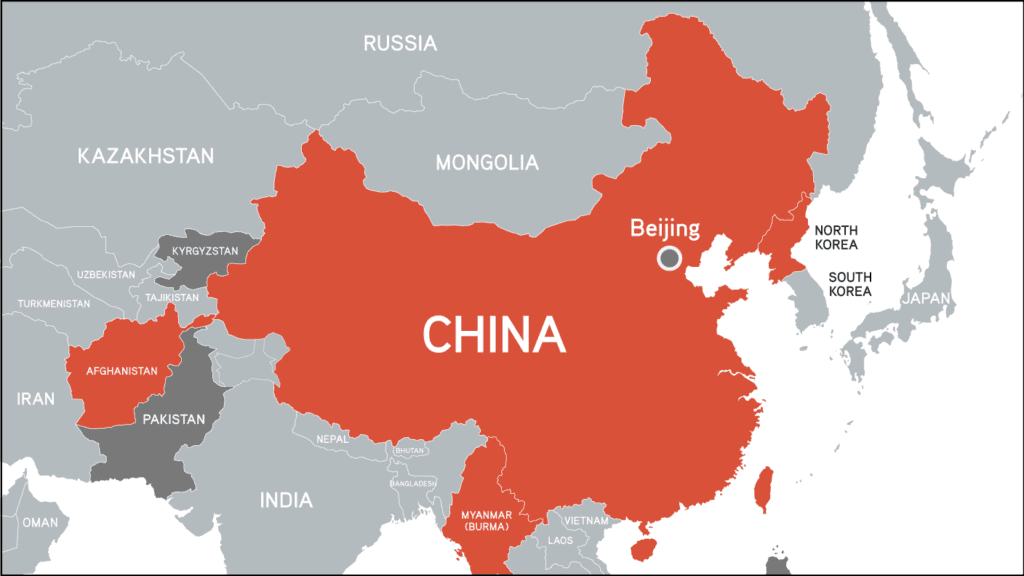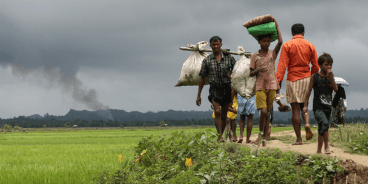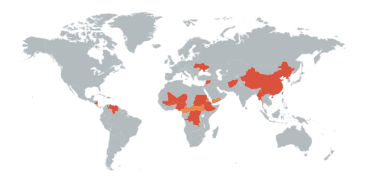China

The Chinese government is committing possible crimes against humanity and genocide by systematically persecuting Uyghurs and other predominantly Muslim and/or Turkic groups. Other religious and ethnic minority groups also face persecution.
BACKGROUND:
China has perpetrated repressive campaigns against religious and ethnic minorities for several decades. In 2016 the Chinese Communist Party (CCP) enacted a policy of “Sinicization” requiring religious groups to align their doctrines, customs and morality with Han Chinese culture and CCP ideology. Under the guise of combating religious extremism, Chinese authorities have pursued multiple discriminatory regulations and repressive campaigns in the so-called Xinjiang Uyghur Autonomous Region (the Uyghur Region), increasing persecution against the ethnic Uyghur community, Kazakhs, Kyrgyz and other predominantly Muslim and/or Turkic groups. A campaign in the Tibetan Autonomous Region (Tibet) has also persecuted and repressed Tibetan Buddhists.
Abuses in the Uyghur Region have significantly escalated since 2017, when authorities passed the “Regulation on De-extremification,” which imposed severe restrictions on religious freedom and practice, including through preventing individuals from praying, growing beards or playing Uyghur music. In February 2024 China expanded these regulations, increasing local surveillance and tightening control over religious education and places of worship. Uyghurs and other predominantly Muslim and/or Turkic groups face mass arbitrary detention, often accompanied by widespread rape, sexual abuse and torture, as well as coercive campaigns to reduce birth rates, including through forced abortions and sterilizations. UN experts have warned that the government has significantly expanded policies that allow for the forcible separation and assimilation of Uyghur, Tibetan and other minority children to state-run orphanages or boarding schools. Meanwhile, Uyghurs around the world face intense surveillance and transnational repression.
In August 2022 the Office of the UN High Commissioner for Human Rights (OHCHR) released a report on the human rights crisis in the Uyghur Region, determining that the extent of arbitrary and discriminatory detention of Uyghurs and other predominantly Muslim and/or Turkic groups may constitute crimes against humanity, with conditions remaining in place for serious human rights violations to continue.
Imams and other religious figures from the Uyghur Region face detention and imprisonment. Authorities have also engaged in the systematic destruction of Uyghur cultural heritage. In recent years, the state-led crackdown on religion has expanded beyond the Uyghur Region, including through the destruction and repurposing of mosques and other Islamic venues in Ningxia and Gansu – areas home to China’s largest Muslim population outside of the Uyghur Region.
More than 100,000 Uyghurs are working under conditions that strongly suggest forced labor. There are significant risks of forced labor across a variety of sectors and industries, including apparel and textiles, technology, solar and automotive, among others. Over 100 international brands have alleged ties to Uyghur forced labor-produced cotton. The governments of Canada, the United Kingdom (UK), the United States (US) and the European Union (EU) have sanctioned Chinese government officials and taken steps to ban goods tied to Uyghur forced labor. The US government’s Uyghur Forced Labor Prevention Act prevents the import of goods made “in whole or in part” in the Uyghur Region. While these actions have impacted the entry of products from certain industries, there are still enforcement gaps related to complex supply chains and weak regulation, which enable continued exports to the US and Europe.
In January 2021 the US formally accused China of committing genocide and crimes against humanity against the Uyghur population and members of other predominantly Muslim and/or Turkic groups. Since then, the parliaments of Belgium, Canada, Czech Republic, the EU, France, Lithuania, the Netherlands and the UK have also recognized the situation in the Uyghur Region as constituting genocide and/or crimes against humanity.
In November 2022 the UN Committee on the Elimination of Racial Discrimination (CERD) referred the situation to the Office on Genocide Prevention and the Responsibility to Protect (OSAPG).
RECENT DEVELOPMENTS:
On 10 February the International Labour Organization published a report detailing increased forced labor practices in Tibet through large-scale transfers of rural workers to state-led programs and coercion through military-style vocational training to weaken religious influence.
During the 57th session of the UN Human Rights Council (HRC) in September 2024, ten countries composing the Xinjiang Core Group reaffirmed the significance of OHCHR’s 2022 report, condemning China’s continued refusal to acknowledge its findings or engage with the UN. The report was also raised during China’s Universal Periodic Review in January 2023, where 20 cross-regional delegations urged its implementation.
In October 2024 the European Parliament passed an emergency resolution condemning China’s repression of Uyghurs and stated the government’s abusive policies amount to crimes against humanity and heighten the risk of genocide.
ANALYSIS:
The widespread and systematic persecution of Uyghurs and other religious and ethnic minorities, including enforced disappearances, forcible transfers, large-scale detention, torture, violations of bodily autonomy – such as forced sterilization and mass forced organ harvesting – sexual violence and denial of information regarding the fate of persons in state custody, likely constitutes crimes against humanity. The Chinese government also appears to be intentionally perpetrating at least four acts prohibited under Article II of the Genocide Convention: “imposing measures intended to prevent births”; “causing serious bodily or mental harm to members of the group”; “deliberately inflicting on the group conditions of life calculated to bring about its physical destruction in whole or in part”; and “forcibly transferring children of the group to another group.”
The systematic destruction of cultural heritage seeks to erase the history and identity of Uyghurs and other groups. Alongside expanded detention and labor facilities, there have been increased restrictions on religious practices and the implementation of mass surveillance, transforming the Uyghur Region into a de facto police state. Many of the systemic violations used in the Uyghur Region — including increased securitization, surveillance, forced separation and assimilation of children and political “re-education” — were developed, and continue, in Tibet. The Chinese government’s “labor transfer” and “vocational training” programs are part of a coercive and exploitative campaign of forced labor aimed at monitoring and indoctrinating Uyghurs and Tibetans while undermining their religious, linguistic and cultural identity.
International condemnation helps highlight the country’s poor human rights record, countering government efforts to evade scrutiny. In response, the CCP has engaged in systemic reprisals against human rights defenders cooperating with the UN system.
RISK ASSESSMENT:
-
- Dangerous rhetoric used by the Chinese government to depict Uyghurs and other ethnic and religious minorities as terrorists.
- A history of institutionalized discrimination targeting religious and ethnic minorities.
- Widespread and systematic practices or violence against the lives, freedom or physical and moral integrity of a protected group, including policies that indicate an intent to erase and/or forcibly assimilate populations in the Uyghur Region and Tibet.
- Attacks against homes, farms, businesses or other livelihoods of a protected group and/or of their cultural or religious symbols and property.
- Repressive measures and likely atrocity crimes disproportionately perpetrated against women.
NECESSARY ACTION:
The government of China should cease ongoing systematic repression of Uyghurs and other religious and ethnic minorities, the practice of forced labor and separating Uyghur children from their families and the deliberate destruction of Uyghur cultural heritage, as well as repeal the “Regulation on De-extremification.” All recommendations issued by OHCHR should be implemented.
Relevant UN experts, including the High Commissioner, should prioritize monitoring of the region and provide regular information to member states, including an update to the 2022 report. Member states should actively work towards formalizing public discussions at the HRC on ongoing atrocity crimes in the Uyghur Region and engage with OSAPG on tangible next steps regarding the CERD referral.
The Organization of Islamic Cooperation, Muslim-majority countries and neighboring states should urge China to cease their persecution of Uyghurs and other targeted groups. All member states should strengthen, expand and reinforce regulations to ban all goods tied to forced labor in China.
Atrocity Alert No. 375: Israel and the Occupied Palestinian Territory, Haiti and China
Related Content

Populations at Risk, March 2025

Atrocity Alert No. 420: Myanmar (Burma), Syria and Forced Labor
